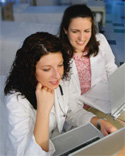
|

|
LYDIA GREEN NURSING PROGRAM, B.S. IN NURSING MAJOR
Marston Hall
206-281-2233
www.spu.edu/depts/hsc/
FACULTY:
Vicki Ann Aaberg, Sandra Affeldt Cotton, Susan M. Casey, Ruby M Englund, Mary Ellen Fry, Christine Marie Henshaw, Emily Wurster Hitchens, Donna K Hoffert, Lucille Marie Kelley, Linda Marie Pedersen, Carol S Redfield, Kathleen M Stetz, Barbara Ann West, Martha Louise Worcester
Admission to the Major
High school preparation for nursing includes a minimum of two
years laboratory science, one of which being chemistry.
For students admitted to and currently enrolled at Seattle PAcific University, preparation
for entry into the nursing major
begins the first quarter of the freshman year. Upon completion
of the first quarter of the freshman year, students who are
interested in applying to the nursing major can request a nursing
faculty advisor from Student Academic Services.
Current SPU students must apply to the School of Health Sciences Lydia Green Nursing Program on or before February 15 of their sophomore year. The
application and a recommendation form are available at the BSN Program Web site by mid-October for program entry the
following autumn.
Transfer and post-baccalaureate students with intent to apply to the nursing major must complete and return both the University application and the School of Health Sciences B.S. with a nursing major application on or before February 15. Applicants must indicate in the University application that nursing is the intended major. Both transfer and post-baccalaureate applications are available here and must be submitted to the Office of Undergraduate Admissions.
All application materials and information for the School of Health Sciences
Nursing Program are available at the SPU School of Health Sciences Web site.
Prerequisite Courses required for making application to the Nursing program include BIO 1100 Biological Science-Nutrition (5). Other BIO 1100 classes do not meet this prerequisite.
Expenses for Basic Nursing Students
General expenses are the same as for other students with the following additions.
- Clinical practicum fee ($75/clinical credit)
- Uniforms and shoes (Approximately $200)
- Books and supplies for the Autumn Quarter beginning the nursing major are approximately $1,100.
- Comprehensive testing program ($120 per year or $240 for junior and senior years). This includes an NCLEX review course at the end of the program.
- Costs for transportation vary for practicum quarter by quarter.
- Costs for weekly parking at practicum sites vary.
- Other costs include a physical examination by primary care provider, current immunizations with yearly updates, personal health insurance, access to a car, and a current driver’s license.
- Costs at the end of the program are for the National Board of Nursing Exam (NCLEX) and state licensure. Check www.ncsbn.org for current costs.
Scholarships and Loans
Students in the nursing major who need financial assistance should
apply to the Office of Student Financial Services. In addition to
general aid and work-study programs, nursing students may want
to apply to government-sponsored programs such as the VALOR
program through the Veteran’s Administration, Health Resources
Services Administration (HRSA), or the armed services through
ROTC at the University of Washington. Students are also encouraged
to apply to local medical societies, tuition reimbursement at
local hospitals (if there is a commitment to work after graduation),
nursing organizations such as the Washington State Nurses Foundation
or community organizations such as Rotary. Scholarships are
also listed on the SHS Web site and in
the scholarship notebook in SHS. The SHS has a number of endowed
scholarships given every year through the generosity of
foundations, alumni, and individuals.
Policies
Educational standards and policies governing students admitted
to the nursing programs and regulations covering a student’s
progression through the nursing program are outlined in the Seattle
Pacific University Nursing Student Handbook (pdf). This handbook is
available online and is given to each entering
student at Orientation.
Special Programs
The nursing program also offers transcultural experience for
students on campus and abroad. Nursing students may apply to
have a transcultural experience during the Winter Quarter of the
senior year. Applications are due early March of the prior year.
Transcultural programs may not be offered every year, depending
upon the international travel conditions and opportunities available.
In addition, the School of Health Sciences has close ties with
Gunma University College of Medical Care and Technology and
Gunma Prefectural Health Sciences College in Japan, offering
summer programs focused on nursing in the United States.
Transfer students should refer to the online equivalency guide to see if your course will transfer to the equivalent SPU prerequisite course. If the course transfers as a natural science or anything other than the SPU equivalent prerequisites listed below, it may not qualify.
| Prerequisite courses are: |
SPU Equivalent |
| Anatomy (5 credits) |
BIO 2129
Human Anatomy and Physiology (5 credits)
|
| Physiology (5 credits) |
BIO 2130
Human Anatomy and Physiology (5 credits) |
| Microbiology (5 credits) |
BIO 3351 General Microbiology (5 credits) |
| Inorganic/General Chemistry (5 credits) |
CHM 1211 General Chemistry (5 credits)
|
| Organic Biological Chemistry (5 credits) |
CHM 1330
Organic and Biological Chemistry (5 credits) |
|
| General Psychology (5 credits) |
PSY 1180 General Psychology (5 credits) |
| Lifespan Psychology (5 credits) |
PSY 2470 Life Span Developmental Psychology (5 credits) |
| Human Nutrition (5 credits) |
FCS 3340 Human Nutrition (5 credits) OR
BIO 1100 BioScience--Human Nutrition (5 credits) |
| Basic Statistics (5 credits) |
HSC 4044 Biomedical Tests, Measurements and Stats (5 credits) OR
MAT 1360 Intro to Stats (5 credits)
OR
PSY 2360 Intro to Social and Behavioral Stats (5 credits)
|
Need to know when a course is being offered? Click here for the 2006-2007 Time Schedule.
 Print Degree Requirements
| Print this Page
Print Degree Requirements
| Print this Page
|